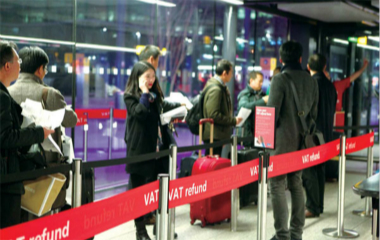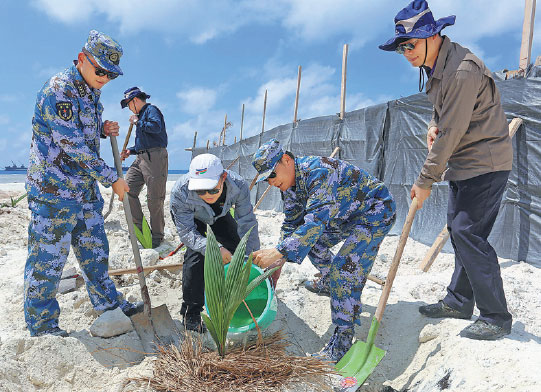Sansha, China's southernmost city, to plant 500,000 trees
Updated: 2016-03-17 08:10
By Huang Yiming and Liu Xiaoli in Haikou(China Daily)
|
|||||||||
China's southernmost city is preparing to plant 500,000 trees within the year in a new "greening of the islands" initiative.
|
Residents and soldiers plant trees at Zhubi Reef in Sansha city, Hainan province. Last year, about 300,000 trees were planted on Sansha's islands and reefs. Xinhua |
Sansha's island location in the South China Sea means the city's forest-building plans will face challenges, including the transportation of seedlings, limited fresh water supplies and extreme weather, including typhoons.
But the tree planting project is seen as vital because the forests will provide a windbreak and prevent shoreline erosion, improve the area's ecology and benefit residents, officials said.
"Transportation is a big issue, all tree seedlings coming in from Hainan island will first arrive in Yongxing island, then they will get distributed to other reefs, most of which are without a port," said Shi Guoning, deputy director of the Bureau of Land and Resource and Environmental Protection for Sansha.
"To transport the tree seedlings to the reefs and sandbars, we will have to use small boats and wait for high tides to reach our destinations," Shi said.
The lack of fresh water for irrigation will be anther major stumbling block. Sansha has invested about 2 million yuan ($306,700) on seawater desalination equipment and water pumps. It also set up a rain water collecting tank system last year to benefit trees being planted in an area called West Sandbar.
"Before that, we had to rent boats to transport fresh water from Zhaoshu island, which is about 3 sea miles away from West Sandbar. It was not easy," Shi said.
But the hard work and expense will be worth it, he said, because the trees will greatly improve the living environment for locals.
Coconut and casuarina trees are the plants of choice because they have a high survival rate in the area's hot, humid, salty and highly sunny conditions.
Last year, about 300,000 trees were planted on islands and reefs, and 90 percent survived, turning the desert islands into green ones.
Sansha has also promoted an "Internet plus tree" adoption activity to involve netizens. For 300 yuan per year, participants can sign up over the Internet to "own" a coconut tree on the city's Zhaoshu island, according to media reports.
Today's Top News
A 24-year-old PKK member is Ankara bomber
China to lead development of Swiss SMEs
Putin says Russians to start withdrawing from Syria
Trump calls campaign 'a lovefest'
German voters batter Merkel over migrant policy
China condemns terrorist attack in Turkey
Growth focus
Opening a window on rural China
Hot Topics
Lunar probe , China growth forecasts, Emission rules get tougher, China seen through 'colored lens', International board,
Editor's Picks

|

|

|

|

|

|







